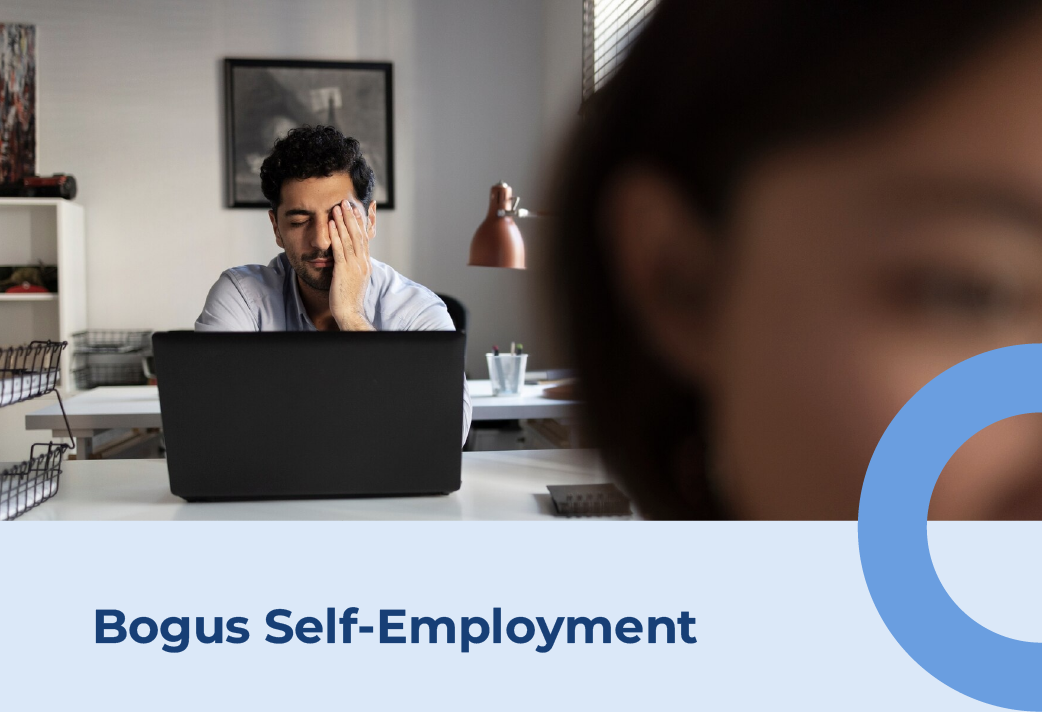Finding qualified workers to fill your company’s needs is not always a quick process. This is especially true when in a new market or foreign country. It may be a faster and more cost-effective solution to hire temporary or part-time workers. This way you can wait until you can find the perfect long-term additions to your workforce. However, the legal requirements for self-employed workers or independent contractors differ from regular employees. As a result, workers in this situation are more at risk of bogus self-employment.
This is an employer malpractice offense. However, self-employed individuals can also engage in false self-employment, either intentionally or unintentionally.
In this article, we define bogus self-employment and the potential federal law penalties around it. We also help you avoid this error by clearly explaining what legitimate self-employment should look like. This way your team and your company can remain legally compliant at all times.
Bogus, or False, Self-Employment: What Is It?
Simply put, bogus self-employment is when a company treats a worker as self-employed worker, but expects them to act as a regular employee. This may be the case for both full-time or part-time jobs. As a result, it relies more on understanding the way a worker performs their duties.
One of the most common ways this can happen is when a business wants to hire new workers without incurring the usual employment costs. The employer can put down the worker as self-employed in the contract so they don’t have to give any benefits, sick pay, or paid leave to the eligible employee as they would with other employed persons. Additionally, self-employed people do not have access to pension benefits, dismissal rights, or other employment relationship protection laws.
A genuinely self-employed individual can also be at risk of bogus self-employment if they start to operate in a similar way to an employee for their clients. Some examples of how this might look include receiving a fixed amount of compensation each month or giving the client full control over how many hours a week they work while the job is completed. These are characteristics of a full-time employee and could result in legal difficulties or fines.
False self-employment deprives a worker of stability, legal rights, occupational safety, and health benefits. Many countries have severe penalties in place for companies or employers who hire workers under bogus self-employment job titles.
The Cost of Bogus Self-Employment
Every country’s employee protection laws are different, but typically class bogus self-employment as fraudulent employment or black labor.
A US company that is investigated by a department of labor and found to be hiring workers with false self-employment contracts will be punished under legislation such as the medical leave act (FMLA). Penalties may include:
· Retroactively paying the worker social security contribution benefits. This can range from three months to four years.
· Paying wage taxes, including back payments. The amount changes according to local regulations.
· Automatically making the worker a full-time employee and paying them full benefits. This includes dismissal protection and severance pay.
If it is determined that the false self-employment was intentional, this will be considered a criminal offense, and a fine and jail sentence may also be given.
Similar laws exist in many countries, with the potential for even more severe penalties.
How to Ensure Valid Self-Employment
Stating “self-employment” in a contract is not enough. You need to also ensure that the worker’s role in the company and the level of control you have over their work is in line with worker requirements.
When hiring a new worker, it’s important to review the essential factors that make a self-employed member of your team different from employees who work normally.
If a worker can ….
– freely decide their work hours without a time card calculator
– choose which companies or clients they work for
– delegate work or assignments to others
– work wherever they want and with their own tools
– handle all their own vacation time, sick days, family and medical leave, taxes, etc.
… then they are legitimately a self-employed worker. An infringement of any of those factors can put your company in danger of bogus self-employment and resultant legal consequences.
As an employer, you also need to make sure that the independent contractors or self-employed workers you hire are not already engaging in false self-employment. You may still be penalized even if you do not originally intend to falsely employ the worker as an independent contractor or freelancer.
How INS Global Helps Keep You Safe from False Self-Employment
Ensuring that a company’s operations are running smoothly can be a difficult and tiring job. It’s not easy to keep track of all the different legal regulations for your staff. Being aware of new labor laws or employment bills is essential.
Any mistake you make can not only cost the company in fees and fines but will also negatively impact the morale and reputation of your business.
Hiring a legal team to guarantee the compliance of your contracting, full-time, or part-time employment is a sound option, but it can increase your operational costs. If you partner with a PEO or EOR you can meet your legal obligations along with cost-saving services for recruitment, hiring, onboarding, and HR services.
INS Global has been helping companies expand worldwide for over 15 years. We offer global expansion expertise in more than 80 countries worldwide. Our legal advisors have the knowledge you need to keep you from any legal pitfalls or obstacles.
By partnering with INS Global, you can rest easy knowing your staff and company are safe and secure while entering new markets quickly and confidently.
Contact us here today to learn more.

SHARE